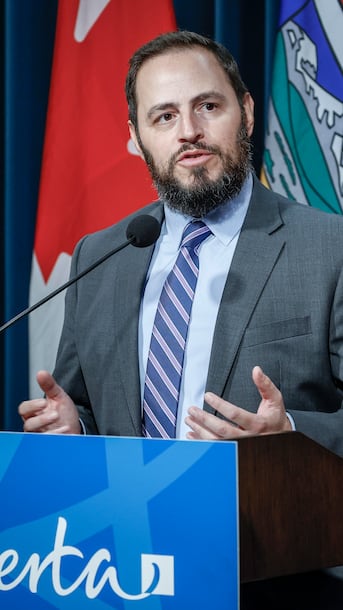Business groups in Alberta say the teachers’ strike has hit the province’s economy — and while there’s optimism about students heading back to school Wednesday, the way the dispute was resolved means more uncertainty about what’s to come.
Alberta Teachers’ Association members have been on strike since Oct. 6. This week, the province invoked the notwithstanding clause to force teachers back to work — a move that’s been widely criticized by labour groups, who have suggested a broader labour response could be coming.
In the time that kids have been off school, small businesses in the province have been hit on two fronts, according to the Alberta chapter of the Canadian Federation of Independent Business (CFIB).
First, there’s the productivity impact of parents taking time off to look after their kids or otherwise being pulled away from their work, said senior policy analyst Kayode Southwood.
Teachers say they are feeling emotional over the government’s decision to pass Bill 2, but will continue to fight for improved classroom conditions.
For businesses that are close to schools, the strike has also meant a more direct hit to their sales, he said.
Jamie Senturk, who owns a pizza restaurant on 17th Avenue in Calgary near one of the city’s largest high schools, said he’s taken a roughly 60-per-cent hit to his lunchtime foot traffic and has cut some shifts as a result.
“As I’m someone without kids, I can’t fully understand what parents and teachers went through during this time, but I can definitely say it’s made a big impact in our business,” said Senturk, a franchise owner of Uncle Fatih’s Pizza.
Ehsan Al-Shammari, who owns another nearby restaurant popular with students, said his business has also become much quieter in recent weeks.
He believes it’s not just because of a lack of students, but due to the broader economic impact of thousands of teachers being off work without pay and of families staying home.
“We are living this impact of the strike on our economy,” said Al-Shammari, owner of Shawarmalicious. “Not just in my restaurant — everywhere. It’s everywhere.”
Wide-ranging impact
Alberta Central chief economist Charles St-Arnaud agrees the economic impact of the teachers’ strike is wide-ranging. In a release earlier this month, he noted parents and especially teachers will likely have reduced their spending to account for being on strike, taking time off work to care for children or paying for additional child care, which could negatively affect other parts of the economy.
Deborah Yedlin, president and CEO of the Calgary Chamber of Commerce, said she’s also concerned about the loss of classroom time for students preparing to enter post-secondary school. The city needs all the human capital it can get, she said, and any hit to students’ education is a potential issue.
“If you’re in a position where you have students that have lost this much time, especially if they are on the senior grades, it should be cause for concern,” Yedlin said.
Southwood, with the CFIB, said his organization had hoped the strike would ultimately be resolved through a mutual agreement, though many businesses will still be happy to see a return to stability.
The Alberta government invoked the notwithstanding clause in its back-to-work legislation, ending a teachers’ strike. The clause allows provinces to override otherwise guaranteed Charter rights.
But there’s a lingering possibility that further labour disputes could be on the horizon. The Alberta Federation of Labour has warned that the group “won’t allow [the province] to continue, unopposed, with their anti-democratic and anti-worker agenda.”
Speaking to reporters on Monday, president Gil McGowan didn’t confirm if a coalition of union groups, known as the Common Front, might consider a provincewide strike, but he said it is one option that is “actively under consideration.”
Jason Foster, a professor of labour relations at Athabasca University, said Alberta doesn’t have a history of widespread labour mobilization but didn’t rule it out.
“We’re dealing with an unprecedented piece of legislation,” said Foster, speaking to The Current guest host Catherine Cullen. “And so that might lead to an unprecedented response.”
In 2022, Ontario Premier Doug Ford’s government tried to ban an education workers’ strike by passing a bill to prevent strike action and impose a contract. The bill included use of the notwithstanding clause.
In response, CUPE workers walked off the job, forcing the closure of hundreds of schools.
Foster said a strong response from people in Ontario and from the labour movement more broadly pushed Ford to back down. The province then repealed the law entirely.







